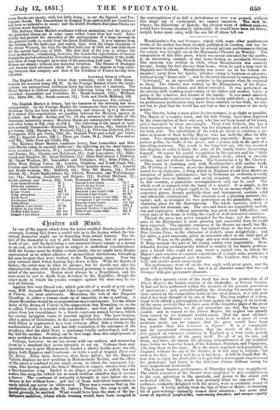ratrtn nub 311untr.
In one of the papers which form the series entitled liandiurgische Dra- maturgic, Leasing laid down a useful rule as to the licence which the his- torical dramatist might use in departing from actual history. The ob- ject of the dramatist is not to give historical lessons, but to produce a work of' art ; and the facts being a raw material chosen simply as a means to an end, are to be looked upon as subject to sssthetical considerations. Still the licence must be within certain limits, else we might have Brutus represented as an ardent admirer of monarchical institutions, beheading his eons because they were traitors to the Tarquinian cause. Now the very rational limit which Leasing lays down is this. With the details of history the artist may do what he plesses ; but he should not alter the characteristin idea with which the historical personage is.associated in the mind of the spectator. Brutus must always be a Republican, and his sone must be put to death from devotion to the Republic; though the exact mode in which the youths conspire against the state may be va- ried ad libitum.
Against this very liberal rule which gets rid of a world of petty criti- cism, MM. Auguste Macquet and Jules Lacroix, authors of the " drame " of Valeria, sin most grievously. Messalina, the wife of the. Emperor Claudius, is either a woman made up of impurity, or she is nothing. A chaste Mcssalina would be as preposterous as a round square. Yet the whole basis of the drama of Valerie is the supposition that Masaalina, or, as she is called, Valeria, is a model wife and mother ; and that all her infamy arises from her resemblance to a. Greek courtesan named Lycisea, which her enemy Agrippina turns to account against her. The poor woman, after a series of vicissitudes, in the cenrse of which the notorious marriage with Silius is repyesented as a very virtuous affair, falls a.victim to the machinations of her foe ' • and her only retaliation is the utterance of the prophecy, that the child Nero, a personage totally undeveloped, will one day kill his mother. Nothing can be less,tragic than this employment of mere accident for a dramatic production. Perhaps, however, we are too severe with our authors, and measuring them by a standard they never intended to set up. Perhaps their only intention was to give Mademoiselle Rachel a showy double part—for she Plays. both .Empress and Courtesan---to write a sort of tragical Three and the Deuce. Even here, however, they have failed ; for the Empress Valeria displays no new qualities in Mademoiselle Rachel, and the effect of the piece is confined to one Single scene, in which she represents Ly- cisca, who having asked the dancer Mnester to supper, amuses him with a Bacchanalian song. Rachel is no singer properly so called, but she makes this song the vehicle for so much reckless abandon that it creates a furore. The courtesan of antiquity is brought at once before the au- dience in her wildest form; and one of those individual impressions is Made which.= never be obliterated. There was a rumour that on tho Production of the Piece at the St. James's Theatre, this song would,' on moral grounds, be omitted. What wouldhave been the state, of the un- feKtunateaudienee, yhuse whole evening would, have been occupied in the contemplation of as dull a melodrama as ever was penned, without this single ray of excitement, we cannot conceive. The clinic in- trigues, the distortions of history, the obvious want of cieftned purpose, would have become absolutely intolerable. It would have been the heavy,
insipid, home-made cake, with the one bit of citron left out.


























 Previous page
Previous page